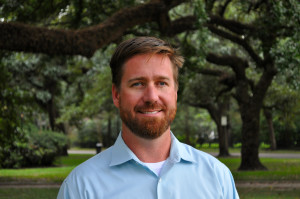Jeff DeQuattro is a 2016 21CSC Champion of the Year. Learn more about the 21CSC Champion of the Year Award.
Jeff DeQuattro
The Nature Conservancy
Jeff DeQuattro serves as the Director of Restoration for The Nature Conservancy’s Gulf of Mexico Program. While at The Nature Conservancy, Jeff has worked on many coastal restoration projects, including some that have engaged hundreds of volunteers. Most recently, Jeff worked with The Corps Network (TCN) to design and manage the first pilot projects of TCN’s Gulf Coast Restoration Initiative. These projects utilized current 21CSC programs (Texas Conservation Corps and Community Training Works, Inc.) in partnership with local NGOs and communities to engage local youth in ecosystem restoration projects along the Gulf Coast. Jeff was also an architect of the recently funded NOAA Gulf Coast Conservation Corps program. In early December 2015, the RESTORE Council voted to allocate $8 million to the development and implementation of a Gulf Coast Conservation Corps (GCCC) Program over the next three years. This proposed GCCC Program will employ approximately 25 crewmembers per Gulf Coast State, per year, with a total of approximately 375 crewmembers working a total of 750,000 hours.
“In Jeff’s spare time, he helps run a non-profit bicycle shop called the Delta Bike Project. This bike shop has become an institution in Mobile, Alabama as they work hard at engaging people at or below the poverty level to earn bicycles and bicycle parts through community volunteerism.” – Joe Gersen, Senior Director of Government Affairs, The SCA
Q&A with Jeff DeQuattro
1. Tell us a little bit about your background. How did you get started in conservation and land/water management?
During college I spent the summer of 2000 working for the Mexican Government at a Sea Turtle Research Station on the Baja Peninsula. My supervisor was very active and respected in the community and I got to experience that. The delicate balance between the depressed economy of a small fishing village and their desire to protect their natural resources made me focus my major on environmental science studies. After I got my bachelor’s in Environmental Studies from UC Santa Cruz in 2004 I went directly into environmental consulting, which brought me to my job at The Nature Conservancy in 2009 as a project manager, and then to my current position as Conservation Corps Program Lead and Director of Restoration for our Gulf of Mexico Program.
2. How did you become involved with the 21CSC/with Service and Conservation Corps?
Work with the Conservation Corps and other similar programs is a priority of our organization, and something I am passionate about. We expanded a strong partnership with the Corps Network in 2014 and helped establish the Gulf of Mexico Conservation Corps with the start of the Climb CDC Conservation Corps in Gulfport, Mississippi. The first crews conducted rapid stream assessments along 9 coastal and streams in urban watersheds along the coast of Mississippi. The two projects lasted just over 4 months and gave us valuable scientific data that we have used to create Conservation Action Plans for that region of the Gulf. From those two phases of a pilot project we expanded with a large grant from NFWF and a private donor that will allow us to continue the work in Mississippi, but also fund the Forgotten Coast Conservation Corps in Apalachicola, Florida, as well as a veteran’s fire corps in 2016.
3. What advice would you offer to other employees from land/water management agencies and nonprofits that are interested in partnering with 21CSC programs (What to expect? Where can they turn for resources?)
Think about conservation corps in terms of achieving real conservation goals – number of acres burned, amount of shoreline restored, number of people and communities reached. These crews have the capacity to achieve measurable and significant goals given the proper training. They also have the best potential to impact and/or influence a community.
4. What advice do you offer to young people in 21CSC programs who are interested in careers in conservation and land/water management?
Conservation corps programs provide a solid foundation for anyone looking to start out in conservation. Young people with that experience already have a leg up on what it means to do real conservation. Work hard, ask questions and keep your mind open.
5. What are the most beneficial aspects of partnering with a 21CSC Program?
The strength of partnerships in the communities that we work. By far that is the most beneficial aspect of our partnership.
6. What do you see as the future of Service and Conservation Corps?
I see an established and sustainable network of conservation corps on the Gulf Coast that help organizations like The Nature Conservancy and others accomplish high quality conservation goals.

